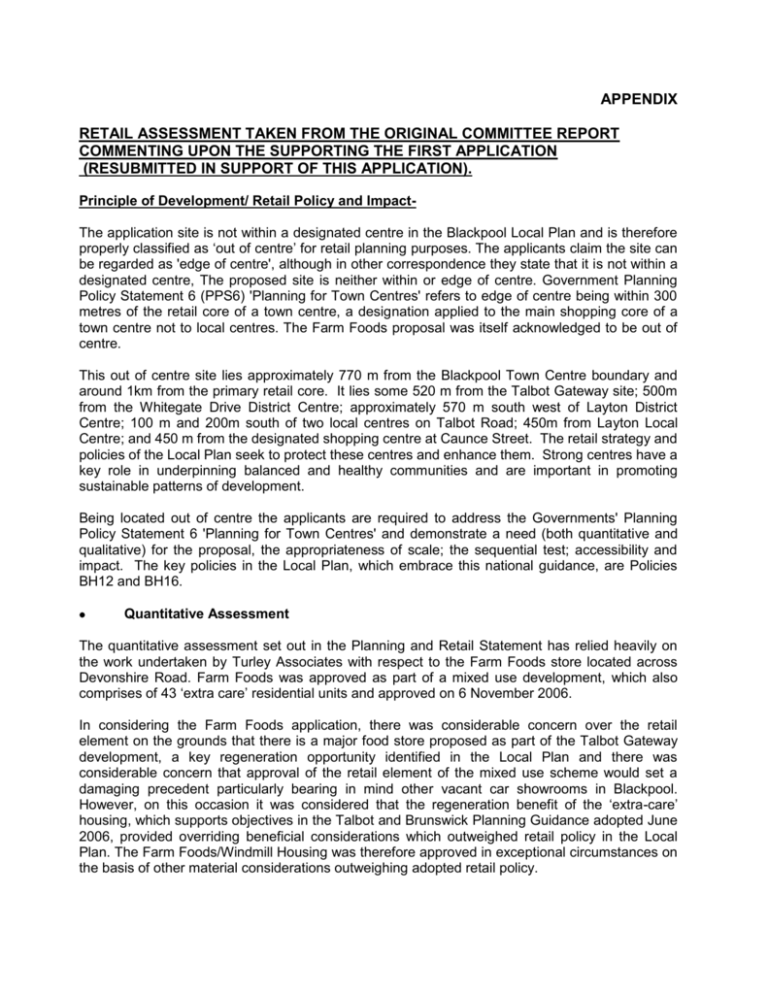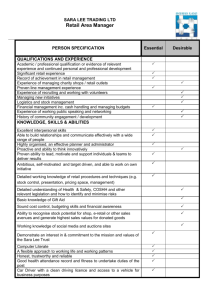Report on Lidl Development
advertisement

APPENDIX RETAIL ASSESSMENT TAKEN FROM THE ORIGINAL COMMITTEE REPORT COMMENTING UPON THE SUPPORTING THE FIRST APPLICATION (RESUBMITTED IN SUPPORT OF THIS APPLICATION). Principle of Development/ Retail Policy and ImpactThe application site is not within a designated centre in the Blackpool Local Plan and is therefore properly classified as ‘out of centre’ for retail planning purposes. The applicants claim the site can be regarded as 'edge of centre', although in other correspondence they state that it is not within a designated centre, The proposed site is neither within or edge of centre. Government Planning Policy Statement 6 (PPS6) 'Planning for Town Centres' refers to edge of centre being within 300 metres of the retail core of a town centre, a designation applied to the main shopping core of a town centre not to local centres. The Farm Foods proposal was itself acknowledged to be out of centre. This out of centre site lies approximately 770 m from the Blackpool Town Centre boundary and around 1km from the primary retail core. It lies some 520 m from the Talbot Gateway site; 500m from the Whitegate Drive District Centre; approximately 570 m south west of Layton District Centre; 100 m and 200m south of two local centres on Talbot Road; 450m from Layton Local Centre; and 450 m from the designated shopping centre at Caunce Street. The retail strategy and policies of the Local Plan seek to protect these centres and enhance them. Strong centres have a key role in underpinning balanced and healthy communities and are important in promoting sustainable patterns of development. Being located out of centre the applicants are required to address the Governments' Planning Policy Statement 6 'Planning for Town Centres' and demonstrate a need (both quantitative and qualitative) for the proposal, the appropriateness of scale; the sequential test; accessibility and impact. The key policies in the Local Plan, which embrace this national guidance, are Policies BH12 and BH16. Quantitative Assessment The quantitative assessment set out in the Planning and Retail Statement has relied heavily on the work undertaken by Turley Associates with respect to the Farm Foods store located across Devonshire Road. Farm Foods was approved as part of a mixed use development, which also comprises of 43 ‘extra care’ residential units and approved on 6 November 2006. In considering the Farm Foods application, there was considerable concern over the retail element on the grounds that there is a major food store proposed as part of the Talbot Gateway development, a key regeneration opportunity identified in the Local Plan and there was considerable concern that approval of the retail element of the mixed use scheme would set a damaging precedent particularly bearing in mind other vacant car showrooms in Blackpool. However, on this occasion it was considered that the regeneration benefit of the ‘extra-care’ housing, which supports objectives in the Talbot and Brunswick Planning Guidance adopted June 2006, provided overriding beneficial considerations which outweighed retail policy in the Local Plan. The Farm Foods/Windmill Housing was therefore approved in exceptional circumstances on the basis of other material considerations outweighing adopted retail policy. The assessment of need for the Lidl proposal is based on a catchment area, which reflects that of the Farm Foods need assessment. Concern is raised as to the appropriateness of this catchment for the Lidl proposal. It should be noted that concerns were raised over the extent of the Farm Foods catchment in the first instance. With respect to the Lidl proposal it is considered more appropriate to establish the catchment of the proposed store by providing information on the current catchment's of existing Lidl stores in Anchorsholme and Ansdell Road. In addition it would appear as currently proposed there would be considerable overlap of catchment's of the proposed and existing Lidl stores. The quantitative analysis put forward in the Statement is not considered to be robust, not only in terms of the defined catchment but also in terms of the various assumptions that have been made including the turn over of existing stores, the available surplus expenditure, sales density and inflow expenditure. In addition with respect to commitments that have been taken into account in the quantitative assessment. It is considered that the commitment in the Local Plan to a major foodstore on the Talbot Gateway site, which is underpinned by the publication of Supplementary Planning Guidance (October 2006) should be included. This Local Plan allocation is supported by evidence set out in the Blackpool Shopping Study 2004. The Talbot Gateway store is vital to effect a fundamental change in promoting more sustainable local food shopping patterns in the Borough and fulfilling the quantitative and qualitative deficiencies identified in the 2004 Study. The cumulative effect of allowing out of centre food retail development would be to diminish the viability of the proposed Talbot Gateway major foodstore. It would also impact on investment and development in district and local centres. Qualitative Assessment In qualitative terms a case for the Lidl store to be provided in this location has not been proven particularly given the proximity of the site to existing facilities and to the proposed food superstore at Talbot Gateway. Existing facilities include Farm Foods on Devonshire Road, Local Centres on Talbot Road containing a Spar and a Premier Essential Express; Layton Local Centre, which contains a Somerfield and the Caunce Street Local Shopping Centre, which contains a Tesco Express Store. The applicant relies heavily upon the proposed Lidl providing lower priced food in an area of low incomes and high deprivation. Farm Foods already itself provides competitively priced food for the same area. The proposal has to be seen in the wider context of the detrimental impact that this and similar out of centre development will have on the quality and accessibility of retail facilities over the wider area and on wider sustainable development objectives. Such development, which if successful is expected to lead to further proposed retail development on the site, will be at the expense of provision within centres. It is likely to increase reliance on the private car, traffic levels, congestion and vehicle emissions. As Local Planning Authority the Council has wider responsibilities and a duty to all its residents. The proposal must be viewed in terms of these wider impacts. In view of the above therefore a case for need both in quantitative and qualitative terms has not been established Sequential Test PPS6 also states that the relevant centres in which to search for sites will depend upon ‘the nature and scale of the development and the catchment that the development seeks to serve'. Notwithstanding the concern raised over the proposed Lidl catchment, it is incumbent on the applicant to search for sites in the catchment area. Taking into account the requirements of PPS6, the applicants approach to the sequential test is considered inadequate. A store of the proposed size is appropriate in the first instance within a district centre role and sites/buildings within or adjacent to such centres should be considered. In addition sites within or on the edge of local centres should also be considered. There are two other Lidl stores within Blackpool are associated with District Centres namely Anchorsholme and Ansdell Road, although the agents state Lidl operate several stores already in Blackpool, reference is also made in the submission to sites outside the area. Whilst the store is presented as an essentially local facility the proposal incorporates a 75 space car park, the maximum allowed under current standards, which suggests it will serve much more than just local needs. PPS6 also promotes the improvement to existing centres in deprived areas through the Local Development Framework and PPS6 also seeks to remedy deficiencies in such areas through the strengthening of existing centres. There is nothing in PPS6 to suggest that applications in deprived areas can forego policy tests. However the applicants have only considered two other possible sites, namely Talbot Gateway and Hounds Hill. Regarding Talbot Gateway the applicants have dismissed this site on the grounds that the site is not available in a reasonable time period. This conclusion is challenged. It is considered that there is a realistic prospect that the site will come forward in a reasonable time scale. A reasonable time period for the availability of sites has been established through the planning appeals procedure as 5 years. Phase 1 of the Talbot Gateway development which includes retail development is due to be completed during 2010 three years hence. The precise mix of development on the site has yet to be determined and the Local Plan policy does not preclude food retail development other than the superstore and Lidl themselves point to stores which exist alongside major food superstores. Conclusion on Principle, Retail Impact and Policy The applicants statistical assessment is not sufficiently robust to place any reliance upon the impact assessment results. Contrary to the applicants assertions the submitted information has been properly assessed with regards to current national and local planning policy and does not belittle the applicants experience in these types of developments. Nor are the re-location ambitions of the current occupants of the site relevant to the Council's determination of the application. Having regard to the above it is concluded that: The proposed development is contrary to Local Plan Policies BH12, BH13, BH14 and BH16; A need for the proposal in both quantitative and qualitative terms has not been demonstrated through robust analysis; The sequential assessment is inadequate; The approval of out of centre retail development without any overriding justification will undermine investment and development that is crucial to the vitality and viability of town, district and local centres including the proposed Talbot Gateway development. It therefore follows that the principle of developing a retail store in this location is not accepted on the basis of the application submission.






